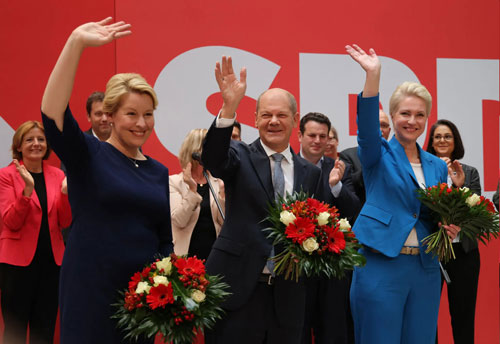Berlin
Germany braced for a period of political unpredictability Monday after the Social Democrats narrowly won a general election but faced a rival claim to power from outgoing Chancellor Angela Merkel’s conservative camp.
Preliminary official results showed that the centre-left Social Democrats (SPD) narrowly won the vote at 25.7%, while Merkel’s centre-right CDU-CSU bloc sunk to a historic low of 24.1%. The Green party placed third at 14.8%, its best result yet but still short of expectations.
The SPD´s chancellor candidate, Finance Minister and Vice-Chancellor Olaf Scholz, said he had a clear mandate to govern.
Despite the poll drubbing, his conservative rival Armin Laschet also claimed the right to try to build the next government — kickstarting a scramble for possible coalition partners.
For a country used to political stability after 16 years of Merkel´s steady leadership, the coming weeks and months promise to be a rocky ride.
Western allies are watching closely, aware that domestic preoccupations could blunt Germany´s role on the international stage and create a leadership vacuum in Europe.
Laschet, 60, and Scholz, 63, both said their goal was to have a new government in place before Christmas.
Citizens “want a change in government,” said Scholz, who ran an error-free campaign that cast him as a safe pair of hands, contrasting sharply with Laschet´s series of gaffes.
The Sueddeutsche newspaper said the vote revealed that “Germans longed for change, but lost their nerve a bit.”
In the fractured political landscape of the post-Merkel era, the most likely outcome will be a three-way alliance — ending the post-war tradition of two-party coalition governments.
Scholz and Laschet will be looking to the Greens and the liberal, pro-business FDP party (11.5%) to cobble together a parliamentary majority.
The two kingmakers however are not natural bedfellows, diverging on issues like tax hikes and public investment in climate protection.
Green chancellor candidate Annalena Baerbock — whose party hoped to do better with the climate crisis a top voter concern this year — stayed vague about her preferred tie-up, but said it was time for “a fresh start” in the country of 83 million people.
FDP leader Christian Lindner suggested speeding up the process by sitting down with the Greens first before talking with the two bigger parties.
Lindner has signalled a preference for a “Jamaica” coalition with the CDU-CSU and the Greens — named after those parties´ black, green and yellow colours — but has not ruled out a “traffic light” constellation with the SPD and the Greens.
Laschet also evoked a sense of urgency, saying Germany´s stint as president of the G7 club of rich nations next year meant it needed a government in place capable of taking action. “The new government must come into office soon,” he said, “definitely before Christmas”.
Neither the SPD nor the CDU-CSU want a repeat of the left-right “grand coalition” that has featured in three of Merkel´s four governments. No party will team up with the far-right Alternative for Germany (AfD), whose score fell to 10.3% from nearly 13% at the last election in 2017.—AFP










